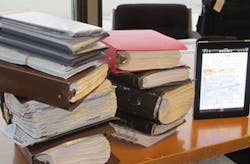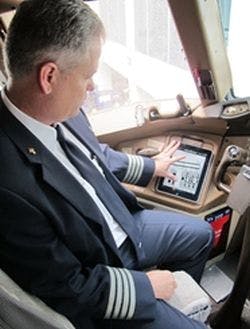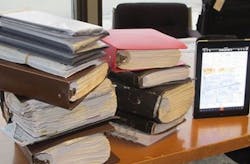iPad EFB app blamed for technical glitch grounding American Airlines planes
American Airlines, in late June of 2013, became the first major commercial airline to discontinue and replace paper terminal charts fleetwide with Electronic Flight Bags (EFBs) – tablet computers loaded with relevant digital charts, maps, and information – used in all cockpits during all phases of flight. An EFB replaces more than 35 pounds of paper-based reference material and manuals that pilots often carried in their carry-on kitbag. American has, for nearly two years, used the Apple iPad on all its current fleet types, including Boeing 777, 767, 757, 737, and MD-80 aircraft, company officials say.
As part of the Electronic Flight Bag program, American's pilots use mobile software and data from Jeppesen, a unit of Boeing Digital Aviation. The FAA-approved Jeppesen Mobile Terminal Chart application, for example, is for gate-to-gate use throughout all phases of flight and, with the exception of a few select documents, replaces paper operating manuals with up-to-date electronic information that is easier to access, officials say.
American’s vice president of safety and operations performance in 2103, David Campbell (now at Horizon Air, in the Alaska Air Group), affirmed that the airline’s EFB program “saves a minimum of 400,000 gallons and $1.2 million of fuel annually based on current fuel prices. Additionally, each of the more than 8,000 iPads we have deployed to date replaces more than 3,000 pages of paper previously carried by every active pilot and instructor. Altogether, 24 million pages of paper documents have been eliminated."
American Airlines serves more than 260 airports in more than 50 countries and territories. American's fleet of nearly 900 aircraft fly more than 3,500 daily flights worldwide from hubs in Chicago, Dallas/Fort Worth, Los Angeles, Miami, and New York. American flies to nearly 100 international locations, including London, Madrid, Sao Paulo, and Tokyo.


